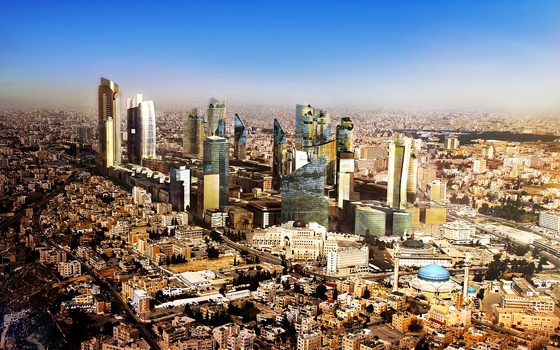The economy of Jordan is picking up strength with forecasts for higher year-on-year growth this year and next, while lower oil prices should provide at least a temporary respite from the kingdom’s energy burden.
According to data from the Department of Statistics (DoS), real GDP growth stood at 3% in the first half of 2014 helped by strong performances in mining, utilities and construction. Jordan is on track for growth of 3% for the whole year, up from around 2.8% in 2013, according to a central bank official speaking in early December. The IMF predicts growth of 3.25% for the year.
A continued drop in oil prices could substantially ease fiscal pressure for Jordan. A 20% drop in oil prices, for example, brings savings of JD800m ($1.1bn) to the kingdom’s JD4.08bn ($5.8bn) import bill, as well as reducing the budget deficit, the central bank governor said in October. In fact oil prices have plummeted by around 40% since the middle of the year. Growth is expected to accelerate to 3.5-4% in 2015 on the back of cheaper energy, stronger external demand and a pick-up in economic activity.
However, one of the main challenges in 2015 is to reduce the primary budget deficit to 2.5% of GDP from a forecast 3.5% in 2014 after grants, mainly through a tighter control of expenditure. The IMF is also calling for further tax reform by the government, on top of parliament’s expected approval of an income tax law by year-end.
Energy import burden
Energy imports, which account for 97% of national consumption, act as one of the largest drains on the economy. According to official data, the cost of energy, including imported crude oil, oil products and natural gas reached 17% of GDP in 2013. However the price of oil falling to a five-year low in December augurs well for further increases in economic growth in 2015.
Jordan is taking measures to reduce its reliance on energy imports with a number of projects to boost renewable energy contributions underway. In March, the government concluded the first round of its three-stage renewable power projects scheme to boost energy generation. The government signed 12 projects, worth $570m and set to generate a total of 470 GWh a year of electricity in the first phase, while it is eyeing a further eight deals at later stages of the project. Jordan has issued a third round of requests for proposals for renewables projects under the scheme.
All the projects under the three phases are due to come on stream by 2018 and the government aims to generate 10% of national energy consumption from renewable resources by 2020.
Meanwhile, measures to offset costly diesel and fuel bills are being implemented. A $65m liquefied natural gas terminal is being constructed at Aqaba, which will become operational mid-2015. In addition to diversifying supplies, the project is set to save the kingdom as much as $500m a year in energy costs, after gas supplies from Egypt have been repeatedly interrupted and curtailed in recent years, forcing Jordan to pay for diesel and fuel bought in global markets.
Reforming the investment environment
Increasing foreign direct investment is high on the list of priorities for the government. November saw the first meeting of the Higher Investment Council, which is charged with drafting strategies to attract investment to the kingdom and is responsible for cultivating a more investor-friendly environment as well as boosting private sector participation in the economy. The council, which is made up of both public and private sector representatives, was created under the kingdom’s Investment Law to unite previously disparate bodies concerned with investment into a single body.
In a further bid to increase private sector participation, a public private partnership (PPP) law came into force in November. Although the government has already signed a number of PPP contracts, the field was subject to various legal ambiguities prior to the passage of the law, reducing Jordan’s ability to harness private capital for the development of public infrastructure. Measures contained in the law in addition to the clarification of PPP contracts include the creation of a council to approve all government contracts with the private sector.
The authorities are increasingly keen to involve the private sector in infrastructure development as the government’s persistent fiscal deficit has constrained its capital investment budget. One avenue of support for the private sector is likely to come through increased European Bank for Reconstruction and Development (EBRD) investments in infrastructure projects. These will help the government handle challenges in electricity production, as well as the water and energy sectors, which have been exacerbated by the growing influx of refugees from Syria.
An announcement by US President Barack Obama in December, that economic aid to Jordan would rise by $1bn to a total of $3bn over the next three years, was widely welcomed. The country is coping with an influx of nearly 1.4m Syrians, expanding the population by about 20%.
Oxford Business Group
29 December
























































